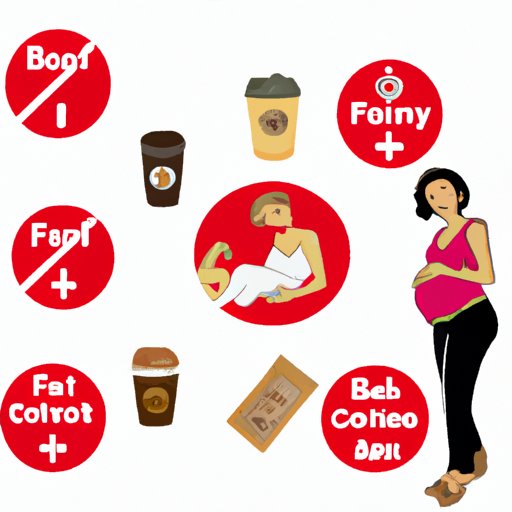Introduction
Pregnant women have many questions about what is safe to eat and drink during pregnancy. One of the most common questions is how much coffee is safe to drink while pregnant. In this article, we’ll explore the recommended caffeine intake for pregnant women, the effects of caffeine on the body, and the pros and cons of drinking coffee while pregnant.
Pregnant Women: How Much Coffee Is Too Much?
The American College of Obstetricians and Gynecologists (ACOG) recommends limiting caffeine consumption to less than 200 milligrams per day during pregnancy. This translates to one 12-ounce cup of coffee or two 6-ounce cups of tea per day. It’s important to note that some sources of caffeine, such as energy drinks or soft drinks, can contain more than 200 milligrams of caffeine in a single serving, so it’s important to read labels carefully.
In addition to the amount of caffeine consumed, other factors should also be considered when determining how much coffee is safe for pregnant women. For example, individual sensitivity to caffeine varies and can affect how much caffeine is safe for each person. Some pregnant women may be more sensitive to the effects of caffeine than others and may need to limit their caffeine intake even further.

What You Need to Know About Caffeine Intake During Pregnancy
It’s important to understand the nutrition facts about coffee before drinking it while pregnant. A standard 8-ounce cup of brewed coffee contains 95 milligrams of caffeine. Instant coffee contains 65 milligrams of caffeine per 8-ounce cup. Other sources of caffeine include tea (30-50 milligrams per 8-ounce cup), sodas (35-55 milligrams per 12-ounce can) and energy drinks (80-150 milligrams per 8-ounce can).
Caffeine is a stimulant that can increase heart rate and blood pressure, cause jitteriness and restlessness, and interfere with sleep. Caffeine can also cross the placenta and enter the fetus, which may lead to increased risk of miscarriage, preterm birth, and low birth weight.

The Pros and Cons of Drinking Coffee While Pregnant
There are both benefits and risks associated with drinking coffee while pregnant. Some studies have suggested that moderate caffeine intake during pregnancy may be beneficial. For example, one study found that having up to 200 milligrams of caffeine per day was associated with a lower risk of developing gestational diabetes. Another study found that moderate caffeine intake during pregnancy was associated with a lower risk of having a baby with a low birth weight.
On the other hand, excessive caffeine intake during pregnancy has been linked to an increased risk of miscarriage, preterm birth, and low birth weight. Therefore, it’s important to limit caffeine intake to no more than 200 milligrams per day.
Is It Safe for Pregnant Women to Drink Coffee?
The short answer is yes, it is generally safe for pregnant women to drink coffee in moderation. However, there are a few guidelines to follow to ensure safety. First, make sure to limit caffeine intake to no more than 200 milligrams per day. Second, avoid consuming more than one cup of coffee at a time. Third, opt for decaf coffee if possible. Finally, consider other sources of caffeine, such as tea and soda, and limit those as well.
Although drinking coffee in moderation is generally safe, it is still important to be aware of the potential side effects of caffeine consumption during pregnancy. These include increased heart rate and blood pressure, jitteriness, restlessness, and difficulty sleeping.

An Expert Guide to Caffeine Consumption During Pregnancy
Medical professionals recommend that pregnant women limit their caffeine intake to no more than 200 milligrams per day. Pregnant women should also avoid consuming more than one cup of coffee at a time, opt for decaf coffee if possible, and be aware of other sources of caffeine such as tea and soda. Additionally, pregnant women should monitor their caffeine consumption closely and consult with their doctor if they have any concerns.
If you’re looking for an alternative to coffee, there are several options. Decaffeinated teas, herbal teas, and sparkling water are all caffeine-free options. Additionally, some foods, such as dark chocolate and cocoa powder, contain small amounts of caffeine, so it’s important to check labels carefully.
The Effects of Caffeine on Pregnant Women
Short-term effects of caffeine on pregnant women may include increased heart rate and blood pressure, jitteriness, restlessness, and difficulty sleeping. Long-term effects may include an increased risk of miscarriage, preterm birth, and low birth weight.
The Risks of Drinking Too Much Coffee for Pregnant Women
Excessive caffeine consumption by pregnant women can lead to an increased risk of miscarriage, preterm birth, and low birth weight. It’s important to limit caffeine intake to no more than 200 milligrams per day and to be aware of other sources of caffeine, such as tea and soda. Additionally, pregnant women should avoid consuming more than one cup of coffee at a time and opt for decaf coffee if possible.
To avoid excessive caffeine consumption, pregnant women should pay close attention to their caffeine intake and consult with their doctor if they have any concerns. Additionally, pregnant women should look for alternatives to coffee, such as decaffeinated teas, herbal teas, and sparkling water.
Conclusion
Pregnant women should pay close attention to their caffeine intake and limit it to no more than 200 milligrams per day. Caffeine can cross the placenta and enter the fetus, which may lead to an increased risk of miscarriage, preterm birth, and low birth weight. Although drinking coffee in moderation is generally safe, pregnant women should be aware of the potential risks associated with excessive caffeine consumption. By following the guidelines outlined in this article, pregnant women can safely enjoy a cup of coffee while ensuring the health and safety of their baby.
(Note: Is this article not meeting your expectations? Do you have knowledge or insights to share? Unlock new opportunities and expand your reach by joining our authors team. Click Registration to join us and share your expertise with our readers.)
